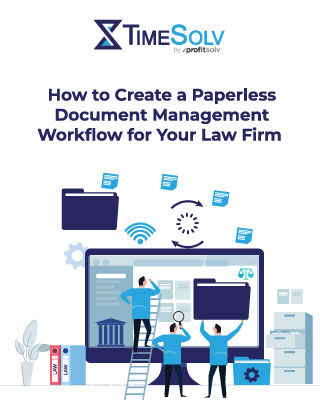As your legal practice has grown, you’ve worn many hats. From marketing and intake to trust accounting and creating and sending invoices, you’ve probably handled just about every administrative task at some point.
But while you may have been quite successful at this balancing act so far, a thriving firm means ever-increasing responsibilities. As demand grows, “doing it all” isn’t feasible long-term.
If you want to achieve sustained growth, you’ll need to find opportunities to outsource time-consuming tasks so you can focus on what you do best: serving your clients.
For many law firms, bookkeeping is a great place to start.
Why outsource bookkeeping?
Bookkeeping is a critical function for any business, especially law firms. Accurate and timely financial records are essential for legal compliance, tax planning, and strategic decision-making.
However, bookkeeping is often too time-consuming and complex for busy attorneys to tackle alongside their caseloads.
Outsourcing bookkeeping saves time and money while ensuring that your firm’s financial records are accurate and up-to-date. A qualified bookkeeper can handle a variety of tasks, including:
- Recording income and expenses
- Reconciling bank statements and credit card accounts
- Preparing financial reports
- Managing payroll
- Filing taxes
The benefits of professional bookkeeping services
By handing off this key task, you can free up precious time and focus on your core legal practice. In addition to the benefits listed below, you might find this leads to higher productivity, improved client service, and increased profitability for your firm.
Greater accuracy for financial records
Busy attorneys may procrastinate on record-keeping, leading to inaccurate or out-of-date information. Professional bookkeepers have the availability to ensure that your bookkeeping is accurate and up-to-date at all times.
Reduced stress
Outsourcing bookkeeping can reduce your mental load and create more space to focus on your core business activities.
Data-driven insights
Professional bookkeepers may recognize financial patterns and share insights into your firm’s business performance, which can help you make better decisions in the future.
Consistent compliance
Bookkeepers who possess knowledge of the legal industry’s strict security and compliance rules provide peace of mind that your firm is in good standing with state and national bar requirements.
Superb security
Professional bookkeepers are aware of the latest security risks and have the resources to protect your client’s sensitive financial data effectively.
Scalability
Focusing on your law firm’s future growth is challenging when you’re barely scraping through your day-to-day to-do list. Outsourcing bookkeeping gives you the space you need to focus on marketing, client intake, and casework.
Expertise
While many business owners take a DIY approach, bookkeeping for law firms is more complex than bookkeeping for other types of businesses. Professional bookkeepers who have experience working with law firms are well-versed in billing and invoicing, financial reporting, tax preparation, and trust accounting, all with an eye toward guaranteeing regulatory compliance.
Now that we know the benefits of professional bookkeeping services, how do you know it’s the right time for your firm to seek them out?
How to Create a Paperless Document Management Workflow for Your Law Firm
To provide your clients with the best value possible, consider setting up paperless
document management workflows.
Don’t know where to start? Consider this your step-by-step map to creating a more efficient, eco-friendly law firm.
Download our free guide to create a paperless document management workflow for your law firm today!
9 signs you may be ready to outsource your firm’s bookkeeping
If you’re experiencing any of the scenarios below, it may be time to consider outsourcing bookkeeping.
1. Your firm’s expanding
As your client roster grows, so is your workload. You’re finding it difficult to keep up with your bookkeeping and other essential tasks.
2. You’re struggling with time constraints
You’re spending too much time on bookkeeping, and it’s taking away from your ability to focus on other important tasks, such as client service and marketing.
3. You’ve noticed bookkeeping errors
You’re losing money or risking your reputation due to bookkeeping errors.
4. You feel out of your depth
You know you don’t have the expertise or experience to handle your firm’s bookkeeping effectively.
5. You’re concerned about compliance
You’re not sure that you’re meeting all of the legal industry’s financial reporting requirements, and want to consult someone with more experience.
6. Security is an issue
You don’t have the resources to implement and maintain strong security measures around bookkeeping, but you want to keep sensitive data safe.
7. You’re planning to scale
You know your bookkeeping operations will need to scale with the rest of your firm, but you can’t afford to hire additional internal staff to tackle the job.
8. You’re merging with or acquiring another firm
Outsourcing, if only during the transition period, can help you to streamline your financial operations and avoid any disruptions.
9. You’re preparing to sell your firm
Clean and accurate financial records are always essential, but getting your books in order may also make your firm more attractive to potential buyers.
Tips for finding a legal bookkeeper
Once you’ve decided that you want to find an outside bookkeeper, having a clear plan will streamline the process and help you choose the right service provider for your firm. Here are a few simple steps to get started.
Decide what you’re looking for
Like other service providers, different bookkeeping professionals have different selling points. Decide what’s most important to your firm, and start your search from there.
For many firms, security is of the utmost concern due to compliance regulations. You might be seeking a bookkeeper that’s very tech savvy and can handle remote communication and tasks with ease. You’ll also want to check on a provider’s customer service record, fees, and pricing structure.
Know what your provider’s services entail
Outsourcing bookkeeping for law firms works by transferring the responsibility of managing your financial records to a professional bookkeeping provider. This can be done on a full-service basis, where the provider handles all aspects of your bookkeeping, or on a more limited basis, such as only handling trust accounting or billing and invoicing.
Clear communication is key to make sure no aspect of the process goes unaddressed. Find out how the provider plans to stay in touch with you.
Consider each provider’s experience and reputation
Referrals from other law firms can be helpful, since you need a bookkeeping provider who has experience in the legal industry. Online reviews are also a great way to determine whether other firms have had a good experience with a particular provider. Look for the values that matter to your firm, such as “trustworthy” and “efficient.”
Ask each provider you’re considering about their experience working with law firms, and whether their company is licensed and insured.
It’s important to set clear expectations with your bookkeeper about the services they will provide and what it will cost. But don’t let the communication stop there. Just as bookkeeping is an essential part of your firm’s daily functions, your bookkeeping provider is an essential contributor to your firm’s team.
That’s why you should look for a bookkeeper who’s invested in your firm’s success and willing to communicate regularly to ensure your books are accurate and up-to-date.
Consider TimeSolv Legal Bookkeeping Services
As your trusted provider of legal software, TimeSolv is well-positioned to tackle your legal bookkeeping needs. Our one-of-a-kind bookkeeping service is designed to provide law firms with a secure, affordable, and time-effective solution for billing and bookkeeping.
If you’re ready to spend more time practicing law instead of creating invoices, try TimeSolv and experience:
- Faster collection of accounts receivable
- Up-to-date records you can view in real time
- A simple, intuitive interface
- U.S.-based customer service
- Significant cost and time savings
- Complete billing service
Sign up for your free trial of TimeSolv today or get in touch if you have questions.
How to Create a Paperless Document Management Workflow for Your Law Firm
To provide your clients with the best value possible, consider setting up paperless
document management workflows.
Don’t know where to start? Consider this your step-by-step map to creating a more efficient, eco-friendly law firm.
Download our free guide to create a paperless document management workflow for your law firm today!



















